By Jim Ellis — Wednesday, March 29, 2023
Senate
California: Rep. Khanna to Remain in House — California US Rep. Ro Khanna (D-Fremont) announced over the weekend that he is ending consideration of entering the state’s open US Senate race and, instead, will back his San Francisco Bay Area colleague, Rep. Barbara Lee (D-Oakland), in her statewide campaign. Rep. Khanna says he plans to seek re-election to the House in 2024, which he claims is the best place for him to serve.Khanna’s move further crystallizes an open all-party March 5 primary race among Reps. Lee, Katie Porter (D-Irvine) and Adam Schiff (D-Burbank). A credible Republican candidate has not yet come forward. Sen. Dianne Feinstein, the Senate’s top senior Democrat, is retiring.
Maryland: Ex-Gov. Hogan Again Says No — Republican leaders are again trying to recruit former Gov. Larry Hogan (R) into the Maryland US Senate race. It appears, however, they will not have any better luck convincing him to challenge veteran incumbent Sen. Ben Cardin (D) in the 2024 campaign than they did in recruiting him against Sen. Chris Van Hollen (D) last year.
Hogan reiterated that he has no interest in running for the Senate, and that includes an open-seat scenario. Sen. Cardin, who will be 80 years old at the time of the next election, is a retirement prospect.
Michigan: Another Takes a Pass — On Friday, Secretary of State Jocelyn Benson (D), who had not previously closed the door on entering the open Senate race, said that she would not run. The move strengthens Rep. Elissa Slotkin (D-Lansing) who, at this point, is the only announced Democratic candidate. Michigan Education Board President Pamela Pugh and actor and author Hill Harper are the remaining noteworthy potential candidates.
For the Republicans, state Education Board member Nikki Snyder is the only declared candidate. Sen. Debbie Stabenow (D) is not seeking re-election to a fifth term. Rep. Slotkin is the clear early favorite for the Democratic nomination and to win the general election in November of 2024.
West Virginia: Gov. Justice (R) Moving Closer to Senate Candidacy — Reports are coming from West Virginia, and even quoting Sen. Shelley Moore Capito (R) as a source, that Gov. Jim Justice (R), who is ineligible to seek a third term in 2024, is moving closer to entering the US Senate contest. Apparently, he held a meeting with the National Republican Senatorial Committee leadership and has been communicating directly with Senate GOP Leader Mitch McConnell (R-KY) about the next campaign.
Earlier, it was reported that Gov. Justice would not announce for the Senate until he had shepherded his major tax cut proposal through the legislature. Now that the revenue bill has passed, it appears the governor will soon declare his federal candidacy.
In order to challenge Sen. Joe Manchin (D) in the general election, he must initially move past US Rep. Alex Mooney (R-Charles Town). The congressman, who declared for the Senate right after the November election and has support from the Club for Growth political action organization, will be a formidable opponent. Gov. Justice, however, has universal name identification and a favorable image throughout the state. He is the obvious favorite.
Manchin appears to be the most vulnerable of the Democratic senators standing for re-election, and the West Virginia race is becoming a must-win for the Republicans if they are to take advantage of a favorable 2024 Senate map that forces them to defend only 11 of 34 in-cycle seats next year.



